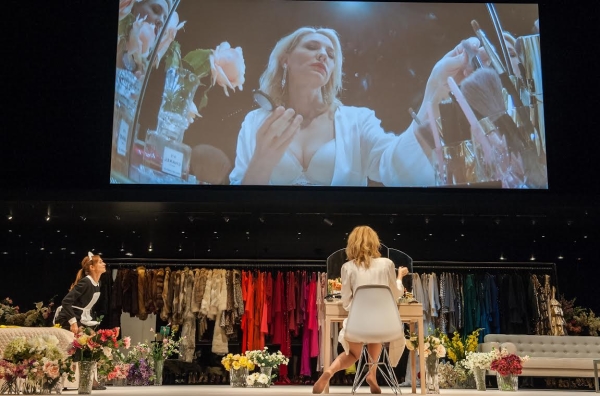The Maids

(© Stephanie Berger)
Have you ever gotten the feeling that you're starring in your own never-ending movie? If so, does that alter your behavior? French playwright Jean Genet examines the strangely common phenomenon of life imitating art in The Maids, which was revived by the Sydney Theatre Company last year in a new translation by Benedict Andrews and Andrew Upton. The production is now making its New York debut at New York City Center as part of the Lincoln Center Festival. This spitty, vulgar, and thoroughly enjoyable revival gets to the heart of Genet's tale while pumping fresh blood into the text.
Claire (Cate Blanchett) and Solange (Isabelle Huppert) are sisters and maids. While their Mistress (Elizabeth Debicki) is out, they act out elaborate confrontation fantasies in which one of the maids takes the role of Mistress and the other the vengeful, murderous maid. Getting carried away in foreplay, they never seem to make it to the deadly conclusion. After they break character (or do they?), Claire reveals that she has written a series of anonymous letters accusing the master of theft, landing him in jail. When he is released on bail, the maids fear they will be discovered and look for a way out.
The set by Alice Babidge looks like the floor of an exclusive boutique in SoHo. A rack of clothes, carefully organized by color, extends across the upstage wall. Pristine white couches blow air-kisses to a cold glass coffee table. A bottle of Fiji water sits on the immaculate bed stand. The stage is dotted with bouquets of flowers, making the space resemble a particularly chic funeral parlor. Everywhere, there are logos and high-fashion labels, pulling the play firmly into the 21st century.
Of course, in the age of the nanny cam, Claire and Solange might not so easily carry out their make-believe sessions unobserved as they would in 1947, when the play was first produced. Director Benedict Andrews makes that readily apparent with the use of several hidden cameras, the feeds of which are projected on a large screen hanging above the stage. There are hidden cameras in the vanity mirror, above the bed, and even in the bathroom. Additionally, two cameramen rove beyond the transparent walls of the space, framing the maids' playtime in bizarre and unexpected ways. While making us feel more paranoid than Edward Snowden, this device also gives these very talented film actresses an opportunity to work their close-ups, as they would in any Hollywood film. Luke Smiles' dramatic classical underscoring solidifies this affect.
All three women play into the cinematic style with theatrical gusto, wildly gesturing and expectorating (often on each other). Blanchett, in particular, has a flair for dramatic mugging. She speaks with a deadly serious tone while grotesquely curling her eyelashes in the mirror. Of course, Claire is playing a role in this moment: that of her employer. Her character study is so detailed and spot-on. In a fairer world, Claire would be an actress rather than a maid.
Debicki enters the play midway, looking very much like Paris Hilton with her chunky glasses and garish fur. Her endless bloviating about her undying love for her man, accented by the occasional emotional outburst, has all the hallmarks of borderline personality disorder. She's an ideal candidate for that popular manifestation of our voyeuristic tendencies: reality TV.
While Blanchett and Debicki seem to be acting in a melodrama, Huppert is in a slapstick comedy. Crucially, she provides the comedic anchor for this very funny play. Her cartoonish physicality and happy-go-lucky line readings are hilarious. Blanchett and Debicki's tragic melancholy is made all the more ridiculous by comparison. You can't escape the sense that everyone is playing a role, propped up by delusions of grandeur and a grasp on reality that slipped away eons ago.
Andrews and Upton have gone for the jugular with their translation, eschewing the academic and literal for something that feels far more like a punch in the gut. It's also largely unprintable. Still, the fundamental theme — the power of pretend to influence our real lives — feels all the more prescient in 2014. This play has aged very well.











